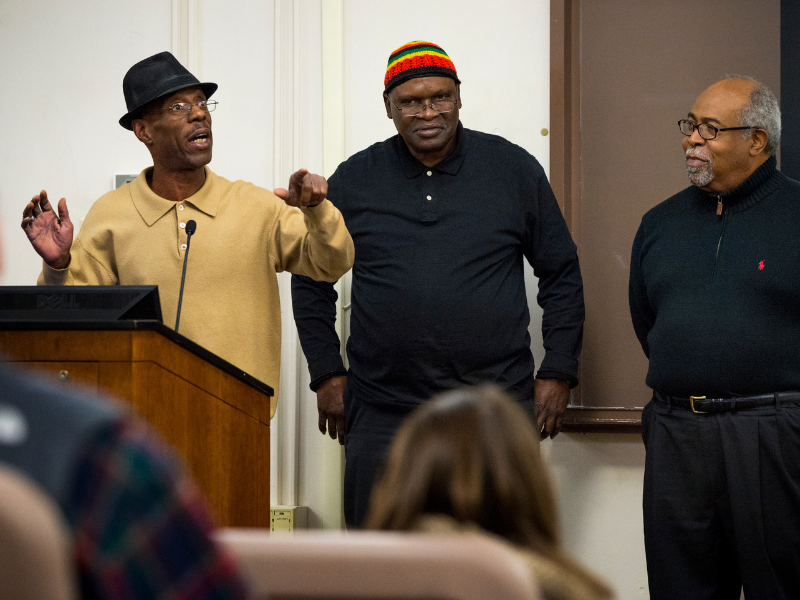You are here
TSSW Announces Three New Undergraduate Courses

While its focus is providing top-tier graduate programs, the Tulane University School of Social offers several undergraduate courses to support the education goals of all Tulanians and integrate with their chosen field of study. This fall, TSSW is pleased to introduce three new undergraduate courses, including “Protest, White Supremacy, Social Justice, and EDI Activism” (SOWK 3500), “No One Lives Forever: Death & Dying in the Modern Era” (SOWK 3200), and “Morphology of Disasters” (SOWK 4800).
The courses open to any Tulane undergraduate student demonstrate the breath of social work expertise and the depth with which it can be explored with intentionality. “Social workers fill a variety of roles in our lives and communities, and they all do it from a strengths perspective,” said Dr. Patrick Bordnick, Dean of TSSW. “These courses provide opportunities to discuss difficult topics and pervasive experiences in a productive, layered, and solution-oriented way. We don’t just want to know the things we know but encourage action and reflection to improve our lives and those around us.”
Protest, White Supremacy, Social Justice, and EDI Activism (SOWK 3500)
Providing context, concepts, and models of social justice activism is the goal of this course developed by TSSW professors and Empowering Change Task Force Co-Chairs Dr. Deidre Hayes and Dr. Reginald. It examines the historical, sociopolitical, sociocultural, legal, economic, and pedagogical aspects as well as the experiential processes related to protest and activism, especially in the areas of equity, diversity, and inclusion.
The course hopes to build knowledge and skills that result in a transformative experience for students. “We want them to understand how different movements build upon each other, separately and in concert, to create change,” said Dr. Hayes. “And, then to answer the questions like ‘once you do the protest, what happens next? How do you affect long-lasting, sustainable change?’”
Students within the class will hear from nationally renowned scholars and activists and examine a variety of eras, approaches, and organizations in order to gain the “nuts and bolts” of participating in social movements. They will then be able to identify the ways they can support and participate in those causes that inspire them and in the ways they are inspired by others.
No One Lives Forever (SOWK 3200)
Master of Social Work Program Director and Clinical Assistant Professor Dr. Crystal Broussard has taught the topic of death and dying to nurses, doctors, lawyers, and other individuals who interact with end-of-life decisions and experiences in their professions; however, everyone can find the course useful. In this course, students will engage with material in a way that both broadens their knowledge of the ways individuals and society interact with the end of life and deepens their personal ability to deal with death and dying.
While the content is not clinical in nature, Dr. Broussard’s experience as a hospice social worker helped inform class readings, discussions, and activities. “We will learn and talk about difficult issues like physician-assisted death, euthanasia, suicide, and violent death. Students will reflect on their own experiences and their ideas of right and wrong,” Dr. Broussard said. “I hope students can become the voice of reason in challenging times. When they see pain in family, friends, and communities, I want them to be able to stand in that with the knowledge they have developed.”
Other topics covered in the course include chronic illness, advanced directives, rituals throughout history and around the world, and the green funeral movement.
Morphology of Disasters (SOWK 4800)
Developing an understanding of what defines and creates disasters as well as their associated impacts and how to mitigate those through policy and legislation is this course’s focus. Director of TSSW’s Disaster Resilience Leadership Academy Dr. Reggie Ferreira has developed the course to extend DRLA’s interdisciplinary approach of disaster preparedness and response that partners with individuals and communities in addressing the root causes of vulnerability.
Root causes, dynamic pressures, and unsafe conditions shape the associated impacts of disaster on the individual, families, households, and communities, and TSSW and DRLA are uniquely positioned to support those who can develop innovative and sustainable solutions for an ever-increasing universal problem. “Given the steep rise of disasters and that we are currently experiencing a disaster with COVID-19, it made sense to share our expertise in the field of disaster management and resilience with Tulane’s undergraduate students,” said Dr. Ferreira. “According to several disaster definitions, it is only a disaster if the human element is involved. Who better than social work, which understands the dynamics and intricacies of human behavior, to introduce students to the human element that is often forgotten when it comes to disasters.”
Students will learn about frameworks for assessing disaster impacts on economic, human, social, environmental, and infrastructure factors, and leading solutions for addressing disasters.
Social Work’s Value and Core Values
Courses like these provide value far beyond completing a requirement or getting a grade. They leverage the core values of social work to bring value to higher education. “I believe that the social work profession and its mission and goals are really principles of life. The things we purport in our profession speak to our entire humanity - encouraging self-determination, supporting marginalized populations, standing up for social justice,” said Dr. Parquet. “Articulating our mission through undergraduate courses provides an example of what education should be about, which is how we relate to each other as human beings.”
The three social work courses are currently available for undergraduate registration along with five others. Questions about each individual course can be directed to the listed professor.
Photo Description: Lawyer Winfield Jr., left, and Theophilus Moore, center, speak to students about their former life of crime and prison time. Professor Reginald Parquet, right, leads the Guns and Gangs undergraduate course at the Tulane School of Social Work, which provides students with real-world experience by hearing from former gang members directly.
Photo Credit: Paula Burch-Celentano, December 2014